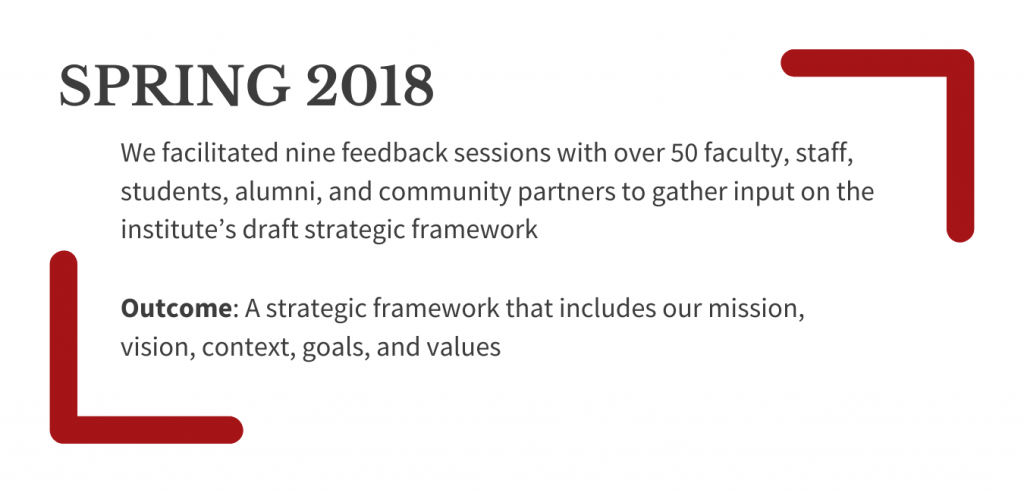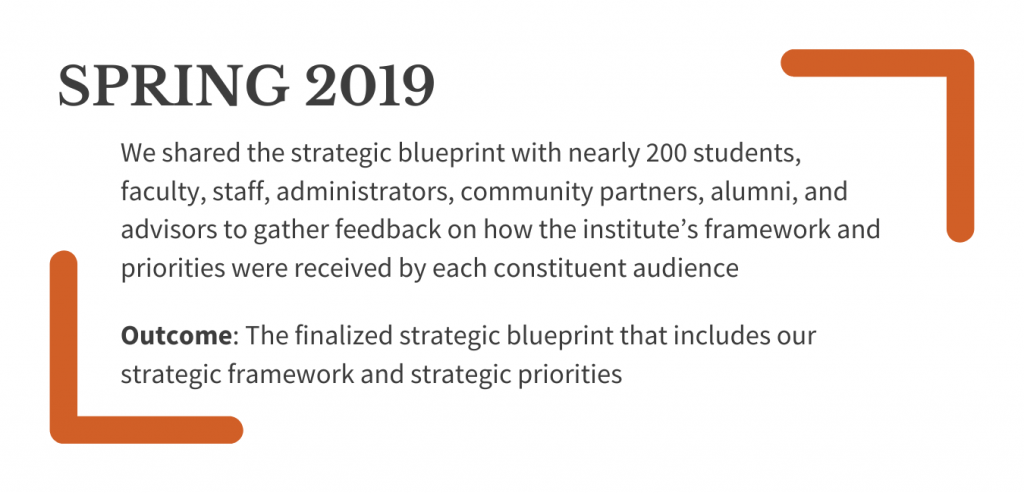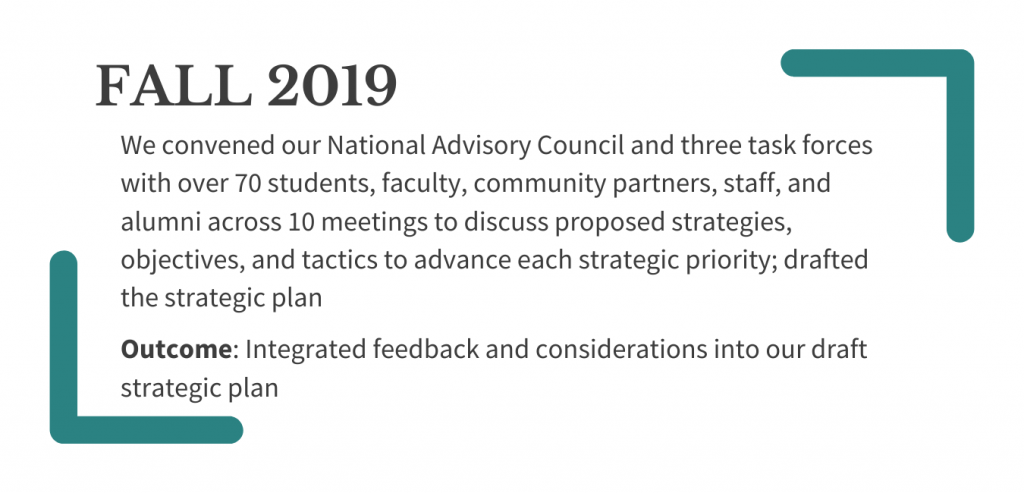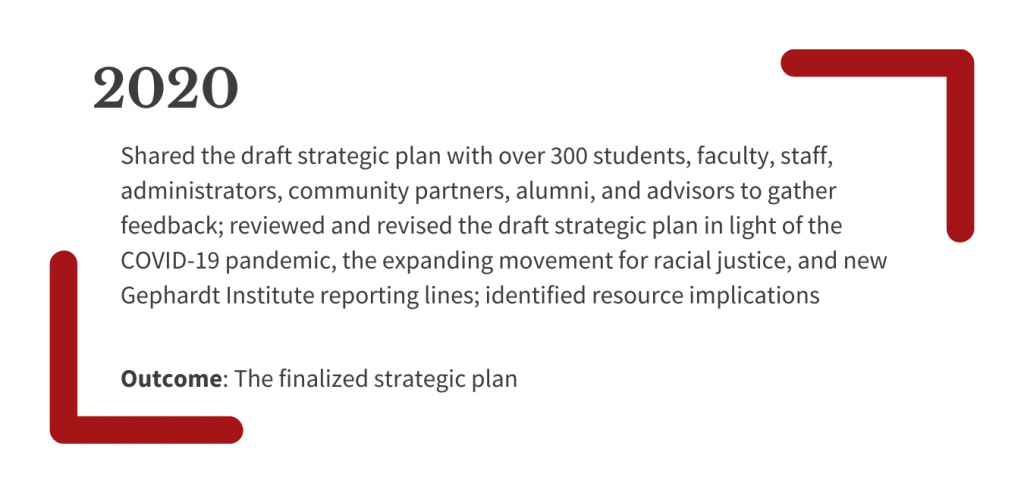“I am immensely proud of what the Gephardt Institute and Washington University have achieved. With this strategic plan as our compass, I am inspired by what we can achieve, and will achieve, with your continued commitment to this essential cause of civic engagement.”
Former Congressman Richard Gephardt
Imagine The Future With Us
The Gephardt Institute for Civic and Community Engagement is at a watershed moment. We face a national civic crisis and urgent challenges locally, nationally, and globally. We embrace a resurgence of civic engagement, particularly among youth, and burgeoning interest in St. Louis community engagement among our students, faculty, and staff. We are challenged to reinvigorate the public relevance of higher education and to deepen the St. Louis community’s trust in Washington University as a substantial partner for regional progress.
As an “action tank” grounded in the education and skills necessary for effective civic engagement, the Gephardt Institute has laid a strong foundation in our first 15 years. We will build on this success through our mission to foster a thriving culture of civic engagement throughout Washington University, realized by engaged citizens, scholarship, and partnerships that advance the collective good.
View The Strategic Plan
Download Full Version: Click here to download the full version of the Gephardt Institute Strategic Plan.
Download “At A Glance” Version: Click here to download the condensed version of the Gephardt Institute Strategic Plan.
To achieve our mission, we will:
- Educate Students for Lifelong Engaged Citizenship: We envision that Washington University students will become alumni who apply a civic lens to their professional, academic, and personal lives, actively engaging in the progress and vitality of their communities.
- Catalyze the University as an Engaged Citizen in St. Louis: We envision that Washington University—through our students, faculty, staff, and alumni—will play an active and substantial role as a partner with St. Louis community organizations, addressing regional priorities to advance a thriving St. Louis.
Through this strategic plan, the Gephardt Institute will provide coordination, infrastructure, and support to our students, faculty, staff, community partners, and alumni through partnership, course, and program development.
We envision that civic engagement will be found “in place” at Washington University: in majors, departments, and schools; in faculty teaching and research; and in the co-curricular life of students. Our goal is not simply the addition of new initiatives. Rather, we are intently focused on high quality initiatives, measurable impact, coordinated and community-driven efforts, seamless civic education, and focused attention on the greatest challenges facing St. Louis.
We will accomplish this through the following priorities:
- Student Pathways: Develop and foster pathways for civic engagement education and involvement for all Washington University students.
- Community Partnerships: Build the infrastructure to support the university and regional organizations in developing and advancing mutually beneficial community partnerships.
- Academic Integration: Bolster resources for faculty and departments to integrate civic and community engagement into teaching.
- Investment in Current Initiatives: Solidify and advance current initiatives within three categories: Engage Democracy, St. Louis Engagement, and Civic Agency.
How We Will Measure Success
Our strategic plan includes detailed indicators of success for each strategic priority. Broadly, we will measure our success by the following indicators:
- Broad student engagement in civic life, defined by metrics of students’ civic knowledge and skills, participation levels in academic and co-curricular opportunities, and commitment to civic engagement post-graduation.
- Cultivation of substantial university-community partnerships, defined by metrics of quality and quantity of partnerships, sustained positive impact on consequential St. Louis community priorities, and community organizations’ satisfaction and trust in Washington University partnerships.
- Growth of civic and community engaged courses, defined by metrics of quality, quantity, and diversity of courses; student learning; advancement of community partner missions; and faculty scholarship.
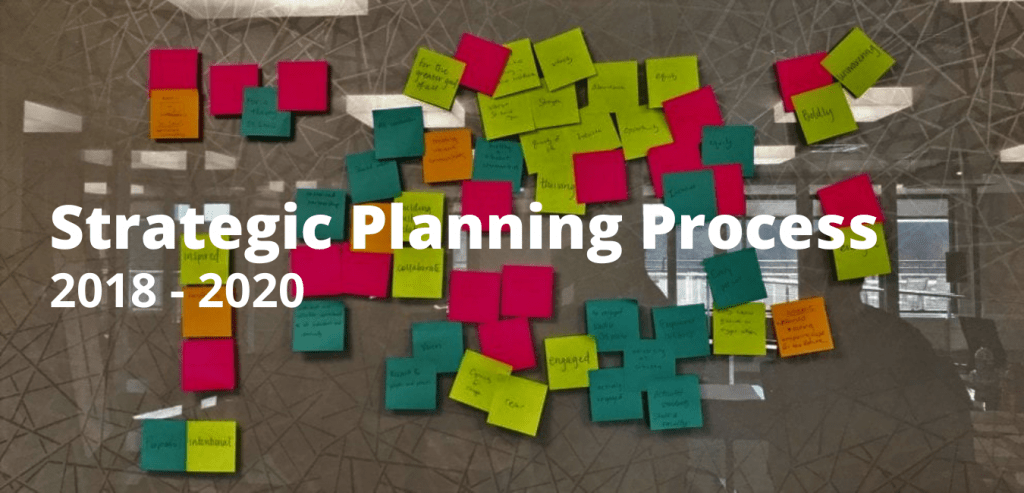
Our strategic plan lays the foundation to engage with the profound opportunities and challenges that were elevated through our strategic planning process.
Through dialogue with over 300 students, faculty, staff, alumni, community partners, and advisors of the Gephardt Institute, we refined our mission, vision, values, context, and goals; determined our strategic direction for current initiatives; and formulated three strategic priorities to guide the institute: Pathways for All Students, Effective Community Partnerships, and Academic Integration.
Citations and Recommended Reading List
Our citations and recommended reading lists not only provide sources for our work, but additional readings that amplify, highlight, and more substantively engage the issues and histories of civic learning in higher education, civic health, race and inequity in St. Louis, and more.
Citations
Recommended Reading
Connect With Us
To achieve our aspirations, we will need to enhance and strengthen our partnerships, resources, and impact. We invite you to connect with our team, and identify how you can contribute and lpartner in this effort.
The opportunity is before us to elevate the Gephardt Institute’s role as a vital engine for civic engagement throughout Washington University, resulting in consequential impact on the civic health of our communities—starting in St. Louis and extending into the world.
Stephanie Kurtzman
Peter G. Sortino Executive Director, Gephardt Institute
stephanie.kurtzman@wustl.edu
Colleen Watermon
Director of Advancement
cwatermon@wustl.edu
Sam Babb
Associate Director of Community Engagement
sbabb@wustl.edu
Alannah Glickman
Associate Director for Civic Engagement
aglickman@wustl.edu
Sonia Sequeira
Director of Programs and Operations
soniasequeira@wustl.edu
